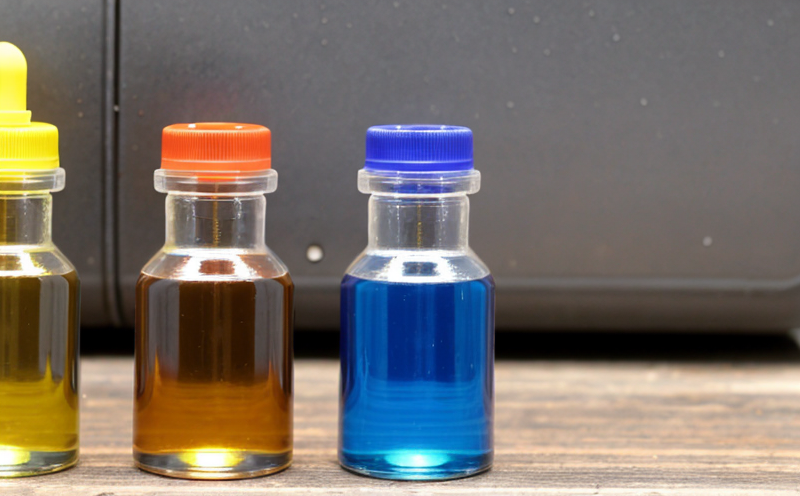JIS K2501 Acid Value Testing in Petroleum Products
The JIS K2501 method is a critical procedure used to assess the acidity level of petroleum products. This test measures the amount of free fatty acids present, which can indicate the potential for corrosion and affect fuel stability over time. The primary purpose of this testing is to ensure that the quality specifications are met as per industry standards.
The process involves titrating a sample of the petroleum product with a standard solution of potassium hydroxide (KOH). The endpoint of the reaction, where the free fatty acids have been neutralized, determines the acid value. This method plays a crucial role in the quality control and compliance processes within the chemical testing sector.
The significance of this test is multifaceted. It helps to ensure that petroleum products meet stringent standards for safe and efficient use. By monitoring the acid value, manufacturers can prevent issues such as fuel oxidation, which can lead to engine damage or reduced performance. Additionally, it aids in maintaining product quality over storage periods.
The JIS K2501 method is widely recognized internationally and is considered a reliable standard for assessing the acidity of petroleum products. Compliance with this test ensures that the product meets customer expectations and regulatory requirements. This testing is essential not only for ensuring fuel stability but also in maintaining environmental standards by minimizing contamination.
The procedure involves several steps, including sample preparation, titration, and calculation of the acid value. Proper specimen preparation includes accurately measuring a representative sample and ensuring it is free from contaminants that could affect the test results. The titration process requires precise handling to ensure accurate endpoint determination.
The JIS K2501 method not only ensures product quality but also supports compliance with international standards such as ISO 878, ASTM D664, and EN 14127. These standards provide a framework for consistent testing methodologies across different laboratories, ensuring reliability and comparability of results.
Understanding the acid value is crucial for various stakeholders in the petroleum industry. Quality managers can use this information to optimize production processes and ensure product consistency. Compliance officers rely on these tests to meet regulatory requirements and avoid legal issues. R&D engineers benefit from this data as they work towards developing more stable and efficient fuels. Procurement teams also need accurate acid value data to select suppliers who adhere to quality standards.
The importance of the JIS K2501 method extends beyond just the petroleum industry. It contributes significantly to environmental protection by reducing the risk of fuel-related emissions that can harm ecosystems. By minimizing acidic compounds, this test supports sustainable practices and helps in mitigating potential hazards associated with acidic content in fuels.
Given its critical role in ensuring product quality and compliance, it is essential for laboratories to have a robust testing protocol. This includes using high-precision instruments such as burettes and pH meters to achieve accurate results. Proper training of laboratory staff ensures consistent application of the JIS K2501 method.
The reliability of the test is further enhanced by regular calibration and maintenance of equipment, which helps in maintaining precision over time. By adhering to these best practices, laboratories can provide reliable and consistent results that are trusted within the industry.
Why It Matters
The JIS K2501 Acid Value Testing is crucial for several reasons. Firstly, it directly impacts product quality by ensuring that petroleum products meet stringent standards. This testing helps in identifying and mitigating potential issues such as fuel oxidation, which can lead to engine damage or reduced performance.
- Ensures compliance with international standards
- Aids in maintaining environmental standards
- Supports sustainable practices by minimizing contamination
- Contributes to product consistency and reliability
- Enhances the reputation of manufacturers by ensuring high-quality products
- Reduces risks associated with acidic compounds in fuels
The results from this testing play a vital role in quality assurance programs. It provides essential data that helps in optimizing production processes and improving product performance. By identifying any discrepancies early, companies can take corrective actions to maintain high standards.
From an environmental perspective, the JIS K2501 method is significant as it supports sustainable practices by reducing the risk of fuel-related emissions. This contributes to mitigating potential hazards associated with acidic content in fuels, thereby protecting ecosystems and human health.
Eurolab Advantages
At Eurolab, we pride ourselves on providing comprehensive and accurate testing services for JIS K2501 Acid Value Testing. Our laboratories are equipped with state-of-the-art instruments that ensure precise measurements and reliable results.
We employ highly qualified and experienced technicians who undergo continuous training to stay updated with the latest methodologies and best practices. This ensures that our tests are conducted consistently, leading to accurate and repeatable results.
Our commitment to quality is reflected in our adherence to international standards such as ISO 878, ASTM D664, and EN 14127. By maintaining these high standards, we ensure that all our testing procedures are reliable and consistent across different laboratories.
We also provide fast turnaround times for test results, allowing clients to receive their reports promptly. This is crucial for decision-makers who need timely information to make informed choices about product quality and compliance.
Our laboratory is accredited by reputable bodies such as ISO/IEC 17025, which guarantees the reliability and accuracy of our tests. This accreditation ensures that clients can trust the results we provide.





